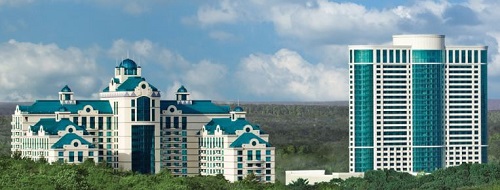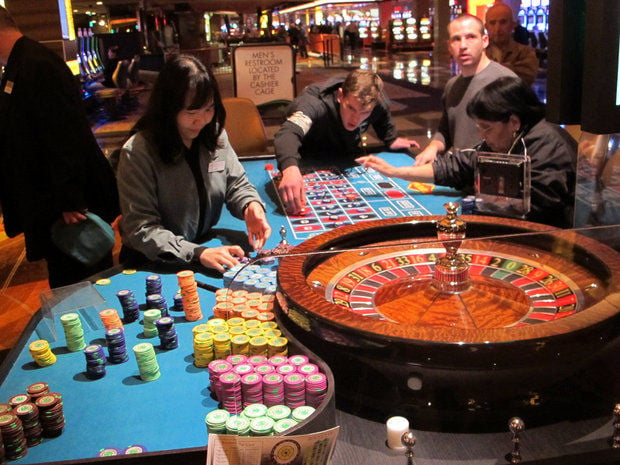 © AP The MGM Springfield casino. Now that two casinos have been licensed in Massachusetts, the state should study the viability of a third.
© AP The MGM Springfield casino. Now that two casinos have been licensed in Massachusetts, the state should study the viability of a third.


The state's 2011 expanded gaming law gave the Gaming Commission the power to grant up to three resort casino licenses. So far, only two have been awarded - to MGM Springfield and Encore Boston.
State gambling regulators have been in no hurry to award a third casino license in Massachusetts, and the disappointing financial performance of the first two casinos makes their inaction seem downright prescient. Neither the MGM casino in Springfield nor the Wynn Resorts casino in Everett has lived up to its rosy expectations, calling into question whether the state really needs a third gambling palace.
Still, those disappointing numbers haven’t dampened enthusiasm for gambling in Southeastern Massachusetts, the only region of the state left out of the casino action so far. The state Gaming Commission is now mulling whether to invite developers to submit ideas for the area encompassing Bristol and Plymouth counties, along with the Cape. As a matter of fairness, officials in Southeastern Massachusetts say it’s high time they got a piece of the economic stimulus other regions have enjoyed.
But if there’s one thing the commission should have learned by now, it’s that projections from casino proponents can’t be taken at face value. Before commissioners act on any proposals, they should conduct their own independent market analysis to determine whether another resort casino of the size required under state casino law would really be viable. The commission voted Thursday to begin seeking public comment on a potential Southeastern casino, a process that could — and should — lead to a full-fledged market study.
- Derek and Greg Stevens acquired their first casino in 2008, and now have three, including Downtown's first ground-up casino in decades. Its the Stevens' third casino — they own The D.
- ATLANTIC CITY, Dec. 19 — The Casino Control Commission today granted the Bally Manufacturing Corporation an operating certificate to open this seashore community's third casino on Dec.
The major reason the region doesn’t already have a casino is the legal travails of the Mashpee Wampanoag tribe, which the Legislature originally expected would own the third casino. Although a tribal casino remains a possibility, the outlook for the 2,800-member tribe has gotten worse since 2011. It’s suffered setbacks in court — a judge tossed out the decision recognizing its land in Taunton as a federal Indian reservation — and also in Congress, where the Senate has declined to pass legislation that would override the judge’s decision. Recently, local media reported that the tribe’s leaders were subpoenaed for records by a grand jury.
But even if the tribe’s efforts fail, that shouldn’t automatically mean awarding a license to a commercial applicant instead. Under the law, the commission doesn’t have to award a license at all. The market has changed since the casino law’s passage in 2011, and the state needs to be sure that the region can sustain a resort casino that costs $500 million, the required minimum investment specified in the law. MGM’s revenues in Springfield were a whopping $144 million below projections. And while it’s early yet, the Everett casino is on track to miss its first-year projections too. The commission has conducted market studies before that concluded a third casino was viable — but that was before the opening of the two casinos.
Neil Bluhm, whose proposal for a casino in Brockton is the only fully developed casino plan in the region, says he wouldn’t be seeking a license if he didn’t think the casino would make money. But that’s not the only factor for the state to consider. The commission also has to take into account whether a third casino would cannibalize revenue from the other casinos and the slots parlor in Plainville. If the market becomes oversaturated, casinos could also start demanding tax cuts to stay in business, putting the state in the position of choosing between state revenues and jobs. (There’s even a scenario in which the state could end up with four casinos, if a commercial casino opens and then the tribe gets recognition, which would allow it to open a casino outside the state’s regulatory framework and pay no casino taxes.)
The basic contours of the dilemma facing regulators in the Southeast region haven’t changed in years. There’s a moral argument for waiting for the tribe, in order to compensate for centuries of poverty and oppression. There’s an economic development argument for going ahead with Bluhm or some other commercial applicant to grab jobs and tax revenues. The one thing that actually has changed since 2011 is that the state now has two casinos operating, and showing disappointing results. With more data at its fingertips, the commission should run the numbers and figure out whether a third casino is a good idea.
ROBINSONVILLE, Miss. (AP) — A casino company announced Tuesday that it’s closing a gambling hall in Mississippi’s Tunica County, the third casino to close in the area since 2014 in the face of increasing competition and declining revenues.
Penn National Gaming announced that it would close the Resorts Casino Tunica on June 30, leaving a six casinos in a county that boomed on gambling revenue in the 1990s.
The company, based in Wyomissing, Pennsylvania, said that it has nearly 200 employees at Resorts and will try to place them at one of Penn National’s other two casinos in Tunica County. The company bought Resorts and what is now 1st Jackpot in March 2017, paying $44 million for two distressed casinos that had been taken over by their lenders. The company also operates Hollywood Casino Tunica, which is next door to Resorts.
Penn National leases the properties from Gaming and Leisure Properties Inc.
Tunica County boomed when gambling was legalized in 1992, becoming the only gambling destination for hundreds of miles. But employment at casinos peaked at 13,000 jobs in 2001, falling to less than 5,000 now, and revenues have been falling since 2006. Revenues in Tunica have shown an uptick in recent months since Mississippi legalized sports betting, but it’s unclear if that will be a long-term improvement.
Resorts was the smallest casino remaining in terms of slot machines and table games after Caesars Entertainment closed Tunica Roadhouse closed in January. Caesars closed the massive Harrah’s Tunica Hotel & Casino in 2014 when it was in bankruptcy.
Third Casino In Connecticut
Tunica has suffered in part because of increased gambling competition in Arkansas and other states. Arkansas voters earlier this month approved a referendum allowing four full-fledged casinos, including one at Southland Gaming & Racing in nearby West Memphis. Arkansas tax figures show Southland won $222 million from gamblers in the 12 months ended June 30, up more than 50 percent since 2014. Operator Delaware North announced a $250 million expansion of Southland in January.
Third Casino In Singapore
“With our acquisition of Resorts Casino as part of the two property deal, we knew we were acquiring an aging barge in need of significant capital improvements,” Al Britton, Penn National’s senior vice president of regional operations, said in a statement. “While we did everything in our control to keep the property profitable over the last two years, increased competition from recent gaming expansion in Arkansas continues to drive the property’s business volumes lower.”
Third Casino In Ct
Third Casino In Massachusetts
The closure means less tax revenue for state and local governments. Tunica County has struggled with declining tax revenue, with county supervisors having to step in and subsidize a full-time fire department that protects the unincorporated area of the county that includes the casinos because property tax collections fell after Harrah’s closed. A private utility district also defaulted on its bonds after Harrah’s closed.